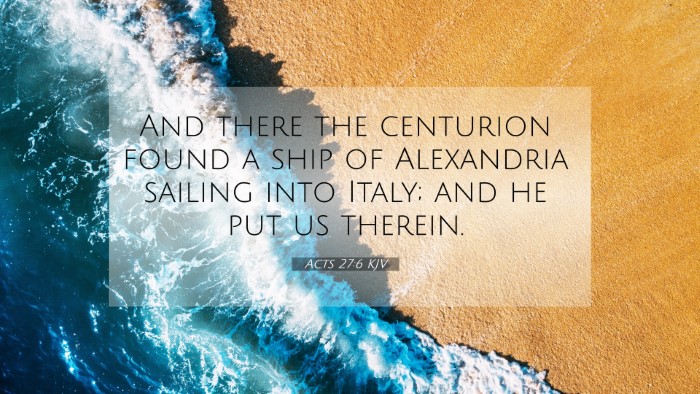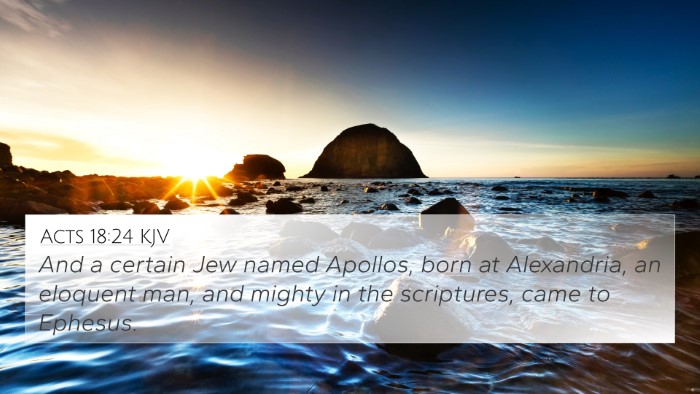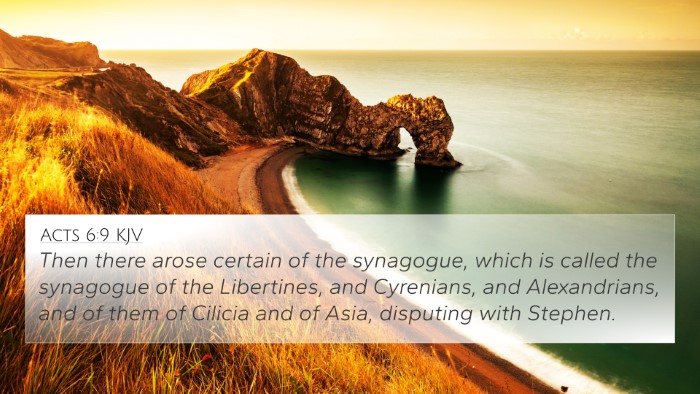Understanding Acts 27:6
Acts 27:6 states, "And there the centurion found a ship of Alexandria sailing into Italy; and he put us therein." This passage narrates an important moment in the Apostle Paul's journey as he is taken to Rome for trial. The verse emphasizes the providence of God in the midst of trials and the importance of guidance during tumultuous times.
Analysis from Biblical Commentaries
This verse has been analyzed in various public domain commentaries which provide a rich understanding of its implications. Here are insights drawn from prominent commentaries:
- Matthew Henry: He points out that God's providence is displayed in Paul finding a ship that would take him closer to his destination. This illustrates God's plan working through circumstances, where even a centurion, a Roman officer, plays a role in the divine plan of spreading the Gospel.
- Albert Barnes: Barnes emphasizes the sovereignty of God in guiding Paul’s travels. The centurion’s decision to place Paul and others on the Alexandrian ship symbolizes God's ongoing care for His servants, ensuring they reach their appointed tasks despite obstacles.
- Adam Clarke: Clarke remarks on the nature of the Alexandrian ship, which was likely a vessel used for commerce. He indicates that despite the perilous journey, God provides a means of transport, highlighting the significance of trusting in God's provision even in uncertain circumstances.
Bible Verse Cross-References
Acts 27:6 can be connected to several other Scripture passages that reinforce its messages of providence, journey, and the effectiveness of God's guidance. Below are eight relevant cross-references:
- Romans 8:28: "And we know that all things work together for good to them that love God, to them who are the called according to his purpose." This verse mirrors the idea of God's sovereignty over every situation.
- Psalm 37:23: "The steps of a good man are ordered by the Lord: and he delighteth in his way." This reflects God’s direction in our lives.
- Proverbs 3:5-6: "Trust in the Lord with all thine heart; and lean not unto thine own understanding. In all thy ways acknowledge him, and he shall direct thy paths." This passage emphasizes reliance on God in our travels and decisions.
- Isaiah 46:10: "Declaring the end from the beginning, and from ancient times the things that are not yet done." It reveals God’s overarching plan in our journeys.
- Acts 18:10: "For I am with thee, and no man shall set on thee to hurt thee: for I have much people in this city." This shows God’s assurance of protection during difficult missions.
- Philippians 1:19-20: "For I know that this shall turn to my salvation through your prayer and the supply of the Spirit of Jesus Christ." Paul expresses confidence in God's deliverance and purpose in his trials.
- 2 Corinthians 1:12: "For our rejoicing is this, the testimony of our conscience, that in simplicity and godly sincerity, not with fleshly wisdom, but by the grace of God, we have had our conversation in the world." This reflects the foundation of relying on God's grace through life’s challenges.
- 1 Thessalonians 5:24: "Faithful is he that calleth you, who also will do it." This reinforces the theme of God’s faithfulness in guiding His people.
Thematic Insights
Acts 27:6 serves as a narrative hub with significant thematic insights surrounding travel, trust, and divine intervention. The verse centers on the following key themes:
- God's Providence: The ship's appearance and the centurion's decision to put Paul on it underline God's hand in seemingly mundane events.
- Divine Guidance: Similar to Old Testament journeys, this New Testament account emphasizes reliance on God’s direction.
- Faith in Adversity: As Paul faced the uncertainty of travel, it exemplifies faith in God amidst trials and obstacles.
- Mission and Purpose: The ship signifies not just physical travel but a journey towards fulfilling divine purpose through Paul's ministry.
Connections Between Bible Verses
The act of cross-referencing Bible verses can deepen our understanding and reveal interconnected stories and themes throughout Scripture. Acts 27:6, through its various references, highlights how one can view Scripture as a cohesive text where events and experiences of believers are interconnected by God’s sovereign plan.
Using tools for Bible cross-referencing, such as a Bible concordance or a Bible cross-reference guide, facilitates a deeper comparative Bible verse analysis. The thematic connections and linking of these verses provide a rich tapestry illustrating God’s unchanging nature and fidelity to His promises.
How to Use Bible Cross-References
Understanding how to effectively employ cross-references can enrich personal study and sermon preparation. Here are steps to help with cross-referencing:
- Identifying Key Themes: Determine the central themes in the primary verse (e.g., providence in Acts 27:6).
- Research Related Verses: Utilize a comprehensive Bible cross-reference system or a Bible reference resource to find related scriptures.
- Take Notes: As you explore the connections, jot down insights that resonate with your understanding of the themes.
- Reflect: Spend time meditating on how these verses combine to reinforce the message of faith and guidance.
- Application: Consider how these insights apply to your life or ministry, enabling you to trust in God’s sovereignty.
Bible Verses That Relate to Each Other
In addition to the straight cross-references provided, consider how different scriptures dialogue with each other, enriching our understanding of God’s work across the Old and New Testaments. For example, one might compare Paul’s responses to adversity in Acts to the experiences of the prophets in the Old Testament, displaying God's consistent support and guidance throughout history.






